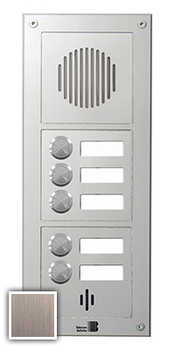Telecom Behnke BT 21-115-IP - Speakerphone BT 21 115 IP
Installation > Low power material > Door Phones

Telecom Behnke BT 21-115-IP - Speakerphone BT 21 115 IP
| Lieske Part No. | 827275 |
|---|---|
| Mfg Part No | BT 21-115-IP |
| EAN-Code | |
| Manufacturer | Telecom Behnke |
| Here only | on request on request
Further information for Telecom Behnke BT 21-115-IP - Speakerphone BT 21 115 IP
20-0001A-IP
Electronics compact (SIP), size 3 • Basic electronics size 3 for door stations with integrated electronics • Connection of up to 8 call buttons, 1 touchpad, 1 display, 1 loudspeaker, 1 microphone • 2 switching relays (max. switching capacity: 2 A / 30VDC, 0.5 A / 40VAC): 1 make contact, 1 changeover contact • 1 alarm input (input voltage 10 V= to max. 15 V=) • RJ45 port for 100baseTEthernet, alternatively via screw terminal (EIA / TIA 568 A) • Additional RJ45 port for connecting additional IP devices, e.g. B. IP camera (no screw terminals) • Large housing (possibility of installing an electronics extension) • Dimensions (H x W x D): 288 x 108 x 72 mm Electronics: • Voice connection via Voice over IP (VoIP) according to the SIP standard via the connected Ethernet LAN using a SIP-capable telephone system, a SIP provider or direct dialing of an IP address • Configuration and software updates via web browser • Power supply: Power over Ethernet (PoE) according to IEEE 802.3af • Integrated PoE -Switch (VLAN support) for connecting another PoE-capable end device with a maximum power consumption of 7 W • Full duplex operation (integrated acoustic echo suppression) • Collective call function / redial • Status / remote control messages for integration with third-party software • 9 voice announcements each Can be stored for up to 40 seconds • 16 MB shared flash memory for phone book and voice announcements • Configuration can be saved in a file Technical data network • MAC address (IEEE 802.3) • IPv4 – Internet Protocol Version 4 (RFC 791) • ARP – Address Resolution Protocol • DNS – A record (RFC 1706) • DHCP Client – Dynamic Host Configuration Protocol (RFC 2131) • TCP – Transmission Control Protocol (RFC 93) • UDP – User Datagram Protocol (RFC 768) • RTP – Real Time Protocol (RFC 1889 ) (RFC 1890) • RTCP – Real Time Control Protocol (RFC 1889) • DiffServ (RFC 2475), Type of Service (RFC 791, RFC 1349) • SNTP – Simple Network Time Protocol (RFC 2030) • SIPv2 – Session Initiation Protocol Version 2 (RFC 3261, 3262,3263, 3264) • SIP in NAT networks (STUN) • Autoprovisioning via DHCP option 66 or via configured server • Backup SIP server configurable • Firmware update via web interface • Integrated POE switch with support for tagged VLANs Voice codecs • G.711 (A-law, µ-law) • G726 (32 kbps) • G.721 • DTMF in-band and out-of-band (RFC 2833), SIP info • Full duplex, echo suppression (AEC) • Speaker volume configurable in 10 levels • Microphone sensitivity configurable in 10 levels Electrical characteristics • Power supply via Power over Ethernet (PoE) according to IEEE802.3af • Max. power consumption: 12 W • SIP intercom station: 5 W • Device on PORT2: max. 7 W • Max. switching capacity of the relays: 2 A / 30VDC, 0.5 A /40VAC • Input voltage alarm input: 10 V to max. 15 V • Operating temperature: -20° C to +50° C 21-3126 Microphone module, 2 buttons • Microphone (bottom) + two call buttons with labeling field • Incl. anti-twist protection for correct module installation • Illuminated labeling field • Front panel: aluminum in V2A design • Material thickness: 4 mm • Dimensions (H x W ): 90 x 90 mm 21-1100-IP module loudspeaker, size 3 • Loudspeaker size 3 (large) • Incl. anti-twist protection for correct module installation • Front panel: aluminum in V2A design • Material thickness: 4 mm • Dimensions (H x W): 90 x 90 mm 21-4310 frame, size 3 • Installation option for three modules • vertical • Incl. anti-twist protection for correct module installation • Front panel: aluminum in V2A design • Material thickness: 4 mm • Dimensions (H x W): 300 x 120 mm 21-2031 Module 3 buttons • Three call buttons with labeling field • Incl. anti-twist protection for correct module installation • Illuminated labeling field • Front panel: aluminum in V2A design • Material thickness: 4 mm • Dimensions (H x W ): 90x90mm 
This is an offer of:
Lieske Elektronik e.K.Reutener Str. 1079279 Vörstetten http://industry-electronics.com Tel. 07666/88499-0 Fax. 07666/88499-111 Diesen Artikel finden Sie unter: industry-electronics.com/artikel/827275 |
